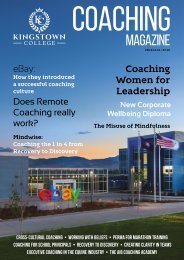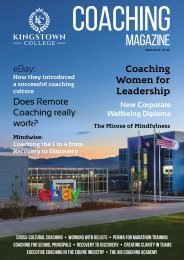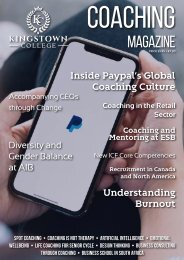Kingstown College Coaching Magazine vol.5 2019/2020
Welcome to another information filled publication of our Coaching Magazine!
Welcome to another information filled publication of our Coaching Magazine!
- No tags were found...
Create successful ePaper yourself
Turn your PDF publications into a flip-book with our unique Google optimized e-Paper software.
90 Coaching Magazine Vol.5
• developing adapted coaching
approaches for the young people
who are using predominantly AI
interfaces from their early childhood,
with a focus on direct human
interaction.
• new coaching practices to motivate
and prepare people to participate in
a job interview in competition with an
AI, and in front of an AI panel member
(AI job interviews are already used in
several countries). Despite this there
are biological limits of speed and
volume of information that can be
processed by humans, which cannot
be overcome even by the best
training. Relations on the job market
and between human and AI coaches
will be probably characterised by
cooperation, complementarity and
competition.
• millennial managers will turn more
and more to digital coaching and
digital “deputies.”
• coaching on the emotional
interactions between AI and people.
There is already a certain convergence
between humans and the digital
world. On one hand digital interfaces
become more and more user
friendly, but also people are adapting
constantly to new technologies.
Humans attach themselves to AI, but
the “attachment” of AI to people will
remain for the foreseeable future a
pure imitation. For humans emotions
are essential as emotions are behind
motivation and goal setting, which
is the drive of a person’s behaviour.
There is the opinion that emotions
play an important role in coordinating
mind’s sub-programmes. Despite the
entry of AI coaching, the value of
human presence and true empathy
will remain a precious gift which
human coaches can give.
One of the big differences between AI
and human intelligence is the process
of thinking and mind awareness. In
2018, the author of this article visited
the exhibition “Artists robots” in Paris
(www.grandpalais.fr/fr/evenement/
artistes-robots), and the impression
was that though the artistic works
often approached what human artists
do in terms of techniques and artistic
creativity, the process was different, and
this was reflected in the end result. Artist
robots combined easily in new ways
(there was 20% liberty of expression
given to the artist-robots) all kinds of
artistic elements, which is one of the
essential traits of creativity, On the
other hand exactly this feature of not
having emotional taboos (for example
disintegrating completely a human face
or creating difficult to support sounds
only from algorithms) gave the author
an uneasy feeling of meeting an alien
intelligence. Emotions and emotional
intelligence are based on thousands
years of biological evolution to go in
pair with cognitive intelligence. As the
process affects the end result, it will be
difficult to imagine that an AI coach will
give the same results as a human coach.
The more functions humans delegate to
AI and robots, the more the difference in
process might influence the end results.
Different end results in coaching should not
be a bad thing, as long as they help people to
develop to reach their highest reaching goal.
Conclusion
The doubling every two years of computer
power, data, and funding will bring an
exponential introduction of AI, not to
mention the possibility of quantum
computers joining forces with AI.
Besides the criteria about technical
security, there should be also taken into
account the general impact on people
and society of the mass introduction of
AI. What will be the impact on psychology
and public health of collaboration
between humans and AI?
ICF, EMCC and the coaching community
should proactively contact industries and
respective government authorities so that
the coaching profession be integrated in
this unprecedented transformation of the
job market from the very beginning: by
coaching employees to orient themselves
to new professions, jobs and occupations,
by contributing to training programmes,
by coaching on the new relations between
humans and AI, using the whole palette of
present and future coaching approaches
and tools to help develop the full potential
of people.
Christa Ilieva
Christa Ilieva is economist and holds a Master in International economic relations. She has experience in this field in different environments:
private and public sectors and NGOs in several EU countries. Christa is graduate of the Kingstown college Advanced Diploma in Personal,
Leadership and Executive Coaching and pursues with passion her coaching practice. She has also hosted solo and collective painting
exhibitions. Christa has participated in brainstorming conferences and platforms on the impact of New Technologies and Artificial intelligence
on society.






